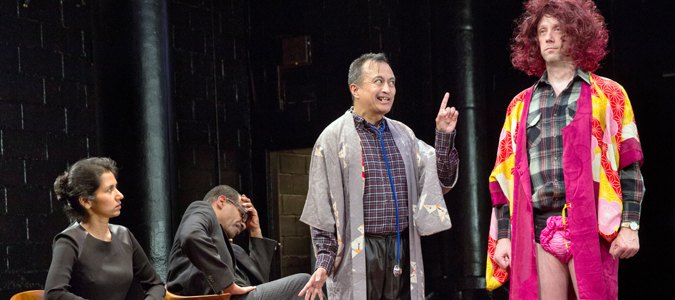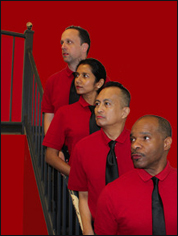

Sorry Robot
Opening Night: January 6, 2015
Closing: January 17, 2015
Theater: New Ohio Theatre
Mike Iveson makes his debut as a playwright with Sorry Robot, a satirical, sentimental, song-studded spaz opera. Four performers and a piano create a haunting world where robots long to feel the same things that their embarrassing and sort-of-pathetic human masters feel, at a hotel that doubles as a software development facility in the dystopian state of Florida in the near future. Beloved downtown performer and 2013 Ethyl Eichelberger Award winner Mike Iveson leads the charge with nine original perverse pop songs which provide a window into the hidden hankerings of robots and humans alike -and which just may convert every human in the room into a metallic automaton.
BUY TICKETSREAD THE REVIEWS:
January 9, 2015
Though it is a tale told by an automaton, there is nothing remotely inhuman about Sorry Robot, which opened at the New Ohio Theater on Thursday night as part of the 2015 Coil festival of experimental theater. On the contrary, this gleeful, ramshackle tale of a not-too-distant future in which machines are our very best friends and our mortal enemies (or has that day already arrived?) is only and all too human. That’s a compliment. Written and composed by Mike Iveson, a staple of downtown theater making his debut as a playwright, Sorry Robot is smart, silly, sloppy and, at moments, joltingly insightful. Like many of my favorite people, this musical sci-fi noir is a charming mess, spilling over with original thoughts and getting higher all the time on its own increasingly far-fetched ideas, until suddenly it all starts to make excellent sense. This play, directed with endearing haphazardness by Will Davis, could surely never have been written by a computer program. Or maybe (sinister chord here, please) it could have been. Narrated by a lifelike but lifeless synthetic creature named Junius (Mr. Iveson), Sorry Robot follows the investigation of Isaac Crownover (Anthony R. Brown), “a high-ranking detective at the Department of U.S. Justice,” into a project to make robots seem more like us — that is, more fallible. (Mr. Iveson’s script was inspired by a story in The Economist about programming imperfection into robots to make them less intimidating to humans.)
READ THE REVIEW


















